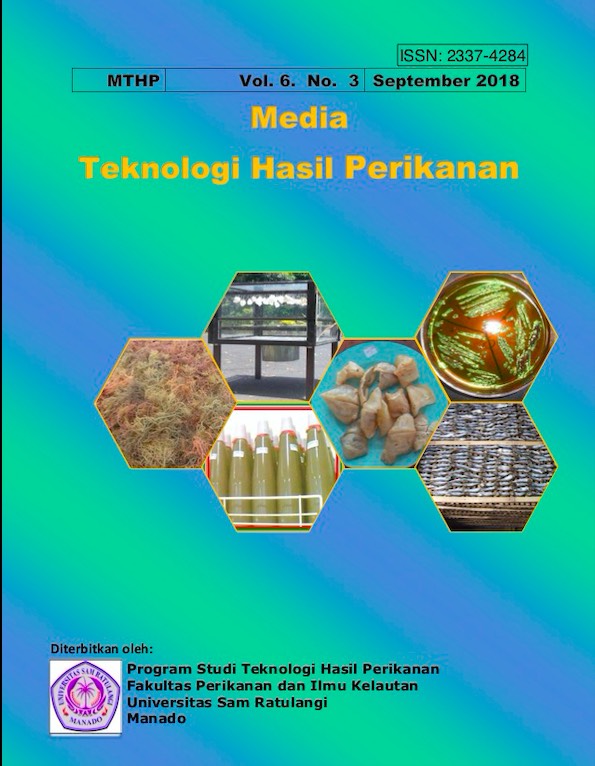EKSTRAKSI KARAGINAN RUMPUT LAUT MERAH (Kappaphycus alvarezii) DENGAN PERLAKUAN PERENDAMAN DALAM LARUTAN BASA
DOI:
https://doi.org/10.35800/mthp.6.3.2018.20642Keywords:
Seaweed, Kappaphycusalvarezii, Semi-refined carrageenanAbstract
Semi-refined carrageenan are a type of carrageeanan product that have a low level of purity because it still contains a small amount of selulose within the carageenan. The purpose of this study is to find out the effect of the concentration of both NaOH and KOH towards rendemen, and the physical and chemical charactheristic of semi refined carrageenan made from kappaphycus alvarezii seaweed, and also to minimize the use of chemical product on SRC production process. The method used in this study is steaming method. The results are the rendemen from NaOH is 10% and KOH 14%. This proves that the concentration of alkali affects the amount of rendemen. The higher the amount of alkali used, the higher the amount of rendemen obtained. Water content obtained from the NaOH samples are 3,75%; while those from the KOH samples are 5%. The ash content of semi-refined carrageenan obtain from NaOH samples are 55,42% and KOH are 55,27%. For the pH level on semi-refined carrageenan obtain from the NaOH samples are 8,06; and KOH are 8,69. The alkali concentration greatly affects the amount of rendemen that is obtained because a higher concentration of alkali during the alkalization process will result in higher pH level, therefore the extration ability of alkali are increased.
Downloads
Published
How to Cite
Issue
Section
License
Authors who publish with this journal agree to the following terms:
- Authors retain copyright and grant the journal right of first publication with the work simultaneously licensed under a Creative Commons Attribution License that allows others to share the work with an acknowledgement of the work's authorship and initial publication in this journal.
- Authors are able to enter into separate, additional contractual arrangements for the non-exclusive distribution of the journal's published version of the work (e.g., post it to an institutional repository or publish it in a book), with an acknowledgement of its initial publication in this journal.
- Authors are permitted and encouraged to post their work online (e.g., in institutional repositories or on their website) prior to and during the submission process, as it can lead to productive exchanges, as well as earlier and greater citation of published work (See The Effect of Open Access).






